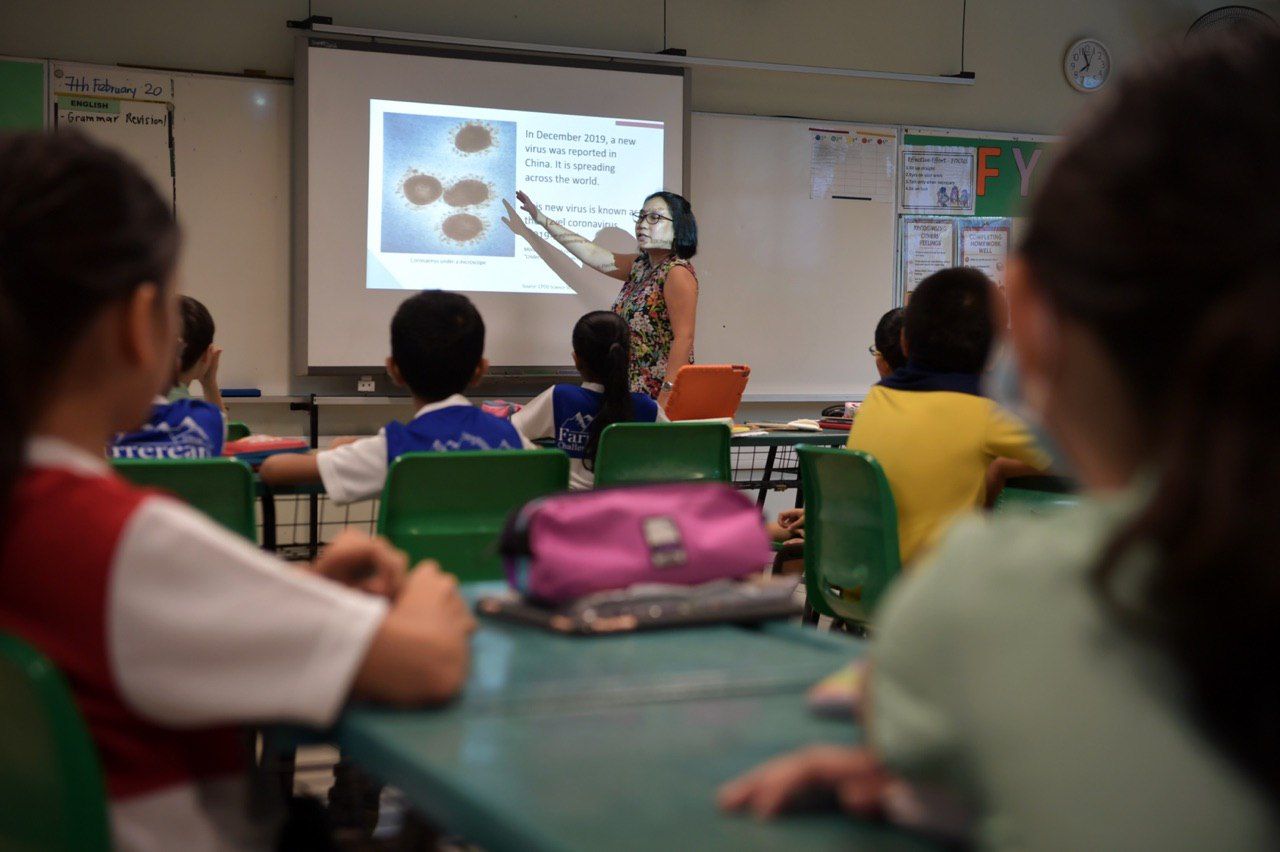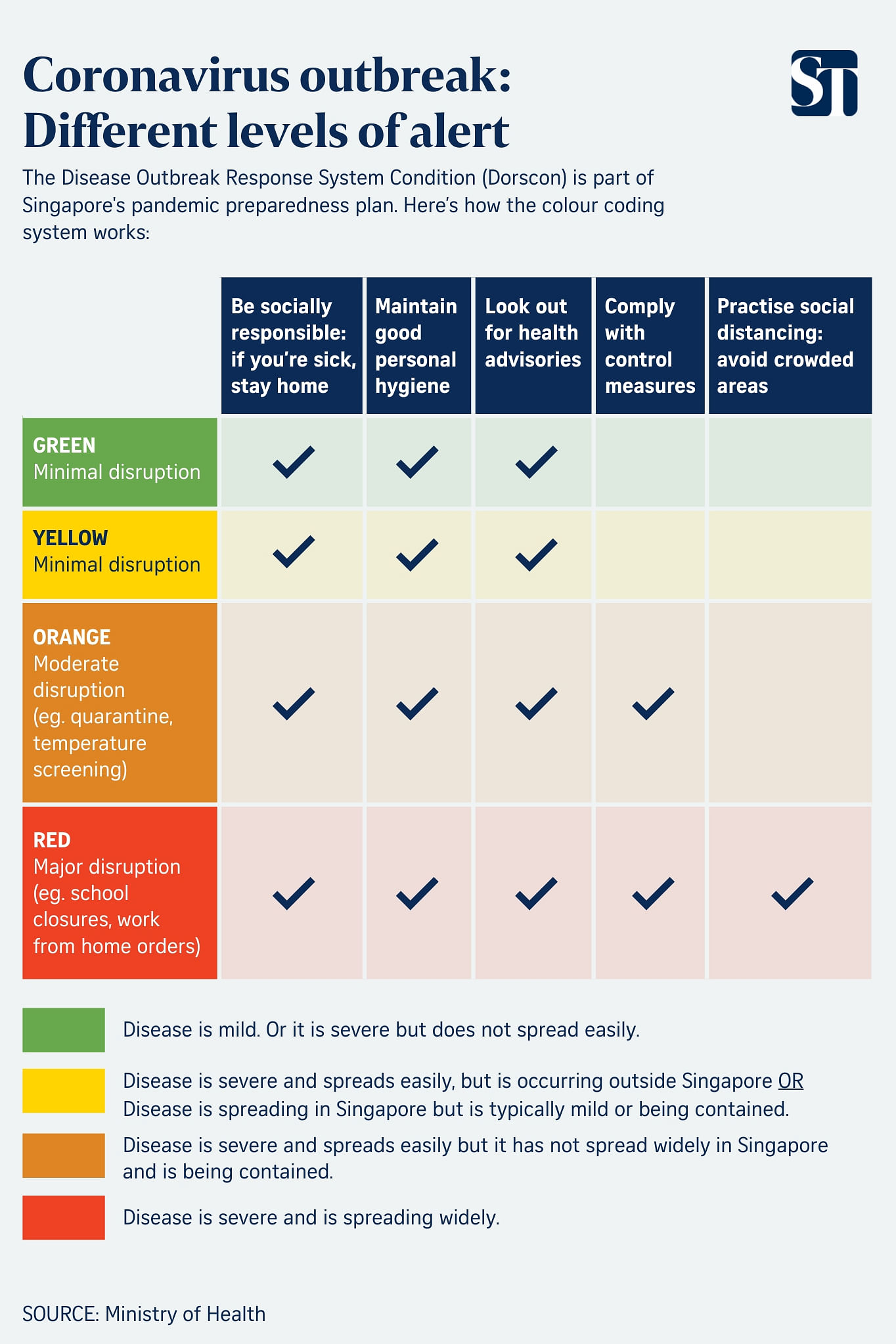Schools roll out programmes to teach students about the coronavirus and how to spot fake news
Sign up now: Get tips on how to help your child succeed

A teacher showing a slide about the coronavirus to Primary 4 pupils during their Character and Citizenship Education (CCE) class at Farrer Park Primary School, on Jan on 7, 2020.
ST PHOTO: KUA CHEE SIONG
SINGAPORE - As Farrer Park Primary School pupils filed into their school early on Friday (Feb 7) morning, some could be seen donning masks.
During a Character and Citizenship Education (CCE) class later, some Primary 4 pupils learnt that masks should be worn only when they are unwell, to prevent germs from being spread to others.
Those in upper primary - Primary 4 to 6 - also learnt how viruses are spread, as well as the importance of verifying the authenticity of a news item on the coronavirus outbreak, among other things.
Schools across Singapore have begun rolling out programmes to educate children on the coronavirus situation, following enhanced measures announced by the Education Ministry earlier this week.
These measures include a suspension of all large group and communal activities such as assemblies, camps and mass celebrations.
The media visited Farrer Park Primary School on Friday to see how some of the new measures were being implemented.
For one thing, instead of going to the parade square for morning assembly, the children walked to their respective classroom where they waited at their desks for the National Anthem to be broadcast over the school's public address system.
Such efforts by the MOE to educate children on the coronavirus situation come on top of enhanced steps implemented earlier such as daily temperature taking.
The MOE and Ministry of Social and Family Development have said that the measures to minimise gatherings of students in large numbers are aimed at protecting students and staff from the coronavirus, which originated in Wuhan, China.
Farrer Park Primary principal Cheong Hwee Khim, 53, said an annual Primary 5 outdoor adventure camp that was slated to begin next Monday was postponed following the announcement of the enhanced measures.
She added: "We have explained to our children (the rationale for postponement) and they are a little disappointed, but I think we need to teach our children to manage that - in life, there will always be disappointments."
Ms Cheong, who was a teacher during the severe acute respiratory syndrome (Sars) outbreak in 2003, said a lesson drawn from that period was the importance of being prepared.
Her pupils are used to temperature-taking exercises, which are conducted twice a year as practice.
The school now has four recess timings, up from two, Ms Cheong said.
"(We have to) learn to adjust to the needs of the situation.
"We looked at our timetable to see how we could split the children into different groups. And at the same time we don't want to disrupt teaching and learning in class.
"We want to ensure that we keep our children very safe and take very good care of them, but at the same time, we want to ensure that life goes on," she added.
Of the 622 pupils in the school, just one is on a 14-day leave of absence, which was implemented for those with recent travel history to China. The teachers check in on him every day, the principal added.
There are about 65 teaching and support staff. None are on a leave of absence.
The school's head of CCE Cardoza Sharon Ann, 48, said there are different education packages for lower and upper primary.
Lower primary pupils learn about basic things such as personal hygiene, where they are reminded to wash their hands and eat healthily.
Those in upper primary learn about higher order issues such as fake news and standing up to prejudice.
Primary 5 pupil Joel Ng, 11, said his parents and grandparents have been encouraging him to read newspapers to learn more about the coronavirus situation.
"On a scale of one to 10 of how worried I am, with 10 being most worried, I'm a four. If we all do our part, we can overcome this as a nation, like my teachers said we did for Sars," he said.
Said Ms Cardoza: "The good thing is that (the education package) is split... and caters to the level of understanding."
While it is a one-off package, she said teachers still emphasise the importance of personal hygiene on a daily basis, such as frequent hand washing.
Secondary school and junior college students also have similar packages tailored for them.
Architect Wendy Koh, 39, whose Primary 4 daughter is in Haig Girls' School, said she is wary of the coronavirus situation, but will let her daughter continue to go to school.
She said the school is doing a good job. For example, it had asked the children to eat in their classrooms during recess, and also advised against playing or mingling outside.
She added: "The Government should look at boosting home-based learning options, such as a live stream of classes by teachers, in case the situation worsens."
A 44-year-old parent, who declined to be named, had a similar suggestion. He has a Secondary 1 son in Hwa Chong Institution.
"MOE should really consider stepping up the measures and consider school closure with e-learning, or an adjustment of school holidays. There will be a lot of people impacted, but we can never be too careful with our next generation."



